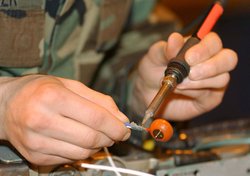Soldering iron
|
|
A soldering iron is a device for applying a point source of heat to melt solder for soldering two materials together. Soldering irons are typically electrically powered.
Small cordless soldering irons are available for fine electronics work. Some are not self-heated but are designed to be heated in a furnace with the advantage of being cordless. Portable cordless irons powered by butane are popular for field work where household current is not readily available. Soldering irons may have interchangeable tips for different types of work. Pyramid tips with a triangular flat face are useful for soldering sheet metal. Fine round tips are useful for electronics work.
Soldering irons often come with a stand to hold the hot iron. The stand may have a sponge and flux pot for cleaning the tip. Some soldering irons for professional use come as part of a soldering station, which allows the exact temperature of the tip to be adjusted, kept constant, and displayed.
A general rule is that the tip of the soldering iron be cleaned and coated with solder between sessions of use. This procedure, called "tinning," assists in the transfer of the iron's heat to the surface being soldered. In most cases, most notably in electronics work, soldering is performed not by smearing molten solder on the work but rather by heating the work itself with the iron to a temperature sufficient to melt the solder and allow it to flow.
Soldering for plumbing typically does not use a soldering iron but a blow-torch instead.
See also
- Solder
- Brazing
- Welding
- Cold Heat which is an electronically controlled cordless iron sold via direct marketingde:Lötkolben
fr:Fer à souder ja:はんだごて nl:Soldeerbout pl:Lutownica
Temperature-controlled soldering station
A temperature-controlled soldering station is a complete unit consisting of an electrical power supply and a soldering iron, used for soldering electronic components. The temperature setting control may be analogue or digital, and there is sometimes a digital display of temperature. Input power consumption is 40 to 60 watts, with a temperature setting that varies from 280°C to 480°C or 200°C to 600°C, chosen according to the type of soldering process.
The temperature is stabilised by a thermostat. When the soldering iron cools down, the heater remains on until the iron tip heats up. Heating is indicated by a red lamp. When the iron has reached the preset temperature, the heater automatically switches off.
The temperature setting is different for lead-based and lead-free solders. Lead-based solder uses 250°C to 280°C or even 300°C while lead-free soldering needs a higher temperature, about 350°C to 400°C. To improve soldering, the solder wire contains a core of rosin foam flux. As this is a high-temperature process, workers should wear gloves. The poisonous fumes produced should be removed by a fume extractor, or the workers should wear masks.

